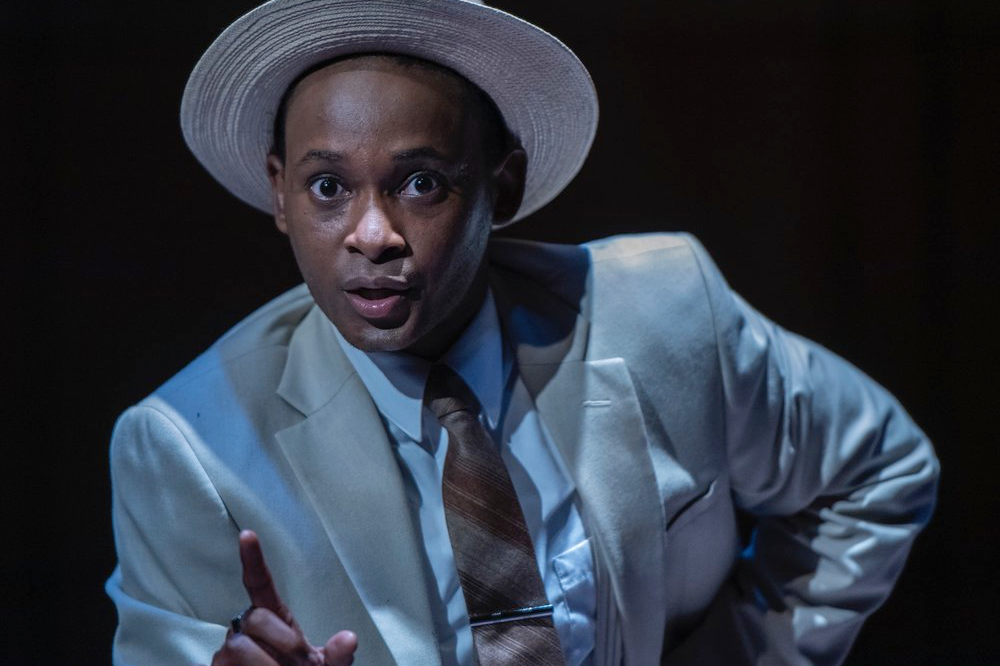Culture
 Antonio Michael Woodard as Emmett Till in “The Ballad of Emmett Till.” Courtesy of Mosaic Theater.
Antonio Michael Woodard as Emmett Till in “The Ballad of Emmett Till.” Courtesy of Mosaic Theater.
The Till Trilogy: Anything But Ancient History at Atlas
October 20, 2022 @ 12:00pm
Watching a trio of plays all about the 1955 murder of Emmett Till sounds like drinking from a firehose of racist misery, and in less capable hands it could be. But the Mosaic Theater Company’s Till Trilogy, written by Ifa Bayeza, directed by Talvin Wilks, and going on at Atlas now until Nov. 20, never wants the audience to suffer for its art.
Make no mistake: It’s brutal. But it would rather converse than preach, rather sing than torture, and rather examine than bludgeon. It plumbs the depths of perhaps the most infamous lynching in American history, and all three performances that this critic attended received standing ovations.
Worth bearing in mind: The legislation to make lynching a federal hate crime was only signed into law less than six months ago and less than 3 miles from the Atlas Peforming Arts Center. It bears Till’s name. So we’re talking about anything but ancient history.
“The Ballad of Emmett Till” is a passion play — it depicts Bo Till’s final days, his kidnapping and his slaying in raw, unflinching detail — and as such, it shies not from the Christ imagery, including a last supper that’s more than a little on the nose. Till, too, took three days to rise to the surface after his death, it takes pains to point out. The shortest and strongest of the three plays, it creates an interesting tension between Emmett the martyr and Emmett the boy. Jesus, of course, knew what was coming; it’s unfair to put this kind of burden (in this case, a major Civil Rights event) on one cruelly victimized 14-year-old Chicagoan visiting rural Mississippi.
Hats off to the ensemble for all three shows — there are no weak links in this chain, certainly not among the six Black actors who perform “The Ballad.” Gripping and clawing at racist injustice with both hands, they take turns breaking your heart. The content is basically pure trigger warning, so you know this isn’t easy work.
As the title character, Antonio Michael Woodard mines deep and comes back with the goods. He doesn’t look 14, but he conjures the soul at the center of the crime, and you’d have to be inhuman not to wish for the script to rewrite history and find a different ending. As his mother, Mamie Till-Bradley, Billie Krishawn holds the stage and then some with her rage and grief. Just imagine going through this journey over and over; Krishawn breathes her character to life and then wrings her dry.
The performances are great across the board, though some of the double-casting leads to double takes, such as Emmett’s grandmother suddenly becoming his sweetheart, but that doesn’t mean Rolonda Watts fails to glow in the former role. Jason Bowen brings a heady mixture of wisdom and shame to the uncle who has Emmett ripped away from his care to a fate of torture and death, while Vaughn Ryan Midder and Jaysen Wright do subtle but invaluable shading and filling work as young witnesses to history.
“That Summer in Sumner,” the newbie of the trilogy, adds white cast members and heavy use of newspaper headline visual projections to the mix as the story morphs into a classical courtroom drama. Woodard’s Bo Till is still here, but more as a spectator to his own proceedings, while Anna DiGiovanni and Christopher Genebach are not going to waste their chances at playing chewily evil Southern racists, questioning whether the mutilated corpse is Till’s at all.
“That Summer” is almost two plays in one, focusing equally on the travesty of a trial Emmett’s killers received and a press gaggle of Black journalists who fought to make sure his story was told. The courtroom scenes are far superior, with Krishawn taking the audience’s breath away when her grieving mother hits the witness stand. The story arcs for the reporters on the scene don’t gel quite as well, but the double casting does offer some high-wire work. Wright, in just one example, disappears into the transformation between natty Northern reporter and rural witness of color for the prosecution; you can practically feel the entire fear-based ethos of the Jim Crow era in his testimony.
Then “Benevolence” brings it all home with a pair of two-handers about families whose lives were ripped apart by Till’s slaying, in once instance because they did the deed themselves. To say more would edge toward spoiler territory for this one, but suffice it to say, it is the dark horse of the three.
Gliding o’er all, meanwhile, are terrific work not just from our writer and director, but a unified technical crew. Andrew Cohen’s set speaks softly while allowing its cast to scream, composer Kwamina “Binnie” Biney’s score is rarely employed but profound, and the costumes from Danielle Preston are stitch-perfect: expressive in a period way without ever stealing focus. Even the shoes are great.
During intermission on Friday, two women who did not come together argued rather insistently over whether the three plays had a proper order or not. People were staring. One tried to play a trump card: She was the playwright Bayeza’s agent. So the other played hers — Bayeza’s childhood friend staying with her for a visit. They made nice and put the debate aside, he added, tilting his phone so they can’t see what he writes, but it is an interesting question.
For sure, things crest — at least busy-wise and in terms of cast size — with “That Summer in Sumner.” It serves as the photography-flash, pomp-and-circumstance Happenings between the horrible, bloody and sweaty event itself and the distant ripples depicted in “Benevolence.” That latter play is the strangest theatrical animal of the three — bifurcated in story by its act break, skipping through time and yet pin-drop spare in its depiction with never more than three people on stage — but also the realest. It burns down focus like a magnifying glass to ants on two Mississippi couples, one white, one Black, confronted with the gruesome, cruel fact of Till’s murder. The script stares at its characters until they either fry under the heat or twist free.
All three shows are a good night at the theatre, but oh, if you have to pick one, make it “The Ballad of Emmett Till.” It is a raw howl of injustice cut through with streaks of humanity like veins of gold in a dark cave. It is ninety minutes long but full to the brim.
In anticipation of seeing this trilogy, I revisited the Emmett Till memorial exhibit tucked away like a secret room in the Smithsonian’s National Museum of African American History and Culture, which includes the poor boy’s original coffin and one of the photos of his face once the damage was done. A mediocre theatrical version of his story might have felt like little more than that exhibit brought to life. This one feels like a lot more.
He would have turned 81 this year.
The Till Trilogy runs through November 20 at the Atlas Performing Arts Center.
Mosaic Theater Company at Atlas Performing Arts Center: 1333 H St. NE, DC; mosaictheater.org // @mosaictheaterdc







